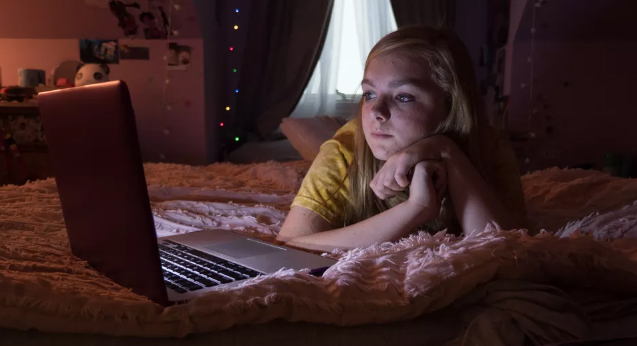Eighth Grade’s take on modern early adolescence is stunning

Newcomer Elsie Fisher makes her way through the last week of a disastrous last year of middle school—shy, isolated from her peers, and struggling for connection with her peers both IRL and online.
While Eighth Grade may be a spot-on depiction of contemporary young adolescence, writes Katie Parker, it’s also gut-wrenchingly familiar and relatable to anyone who has ever been sad or awkward or a teenager.
Eighth Grade follows 13-year-old Kayla as she navigates the social pitfalls of her last week in middle school. Shy, awkward, a bit pimply and totally neurotic, Kayla is a queasily real portrait of life as a member of Generation Z.
Too shy to talk to her classmates and embarrassed by her single father’s attempts to connect, she instead expresses herself primarily via the online void: dispensing baseless advice on her YouTube channel; leaving sweet but inane comments on stranger’s Instagram posts; researching sex acts through nightmarish wiki-hows.
Written and directed by 28-year-old former YouTube star Bo Burnham and starring truly incredible newcomer Elsie Fisher, Eighth Grade has an extremely firm grasp on its subject matter—and it shows.
Keenly aware of the way young people (and really all people) are increasingly consumed with the full-time job of self-improvement, Burnham plunges us into Kayla’s state of constant, breathless anxiety. More than happiness, what Kayla wants is to succeed at living the life she pretends to on the internet—a pursuit that only exposes the alienation and cruel individualism that seems to characterise life in the digital age.
With an almost documentary-like realist aesthetic and equal parts comedy and tragedy, how you feel about Eighth Grade’s squirm-inducing verisimilitude could go either way, and even within our small screening reactions varied wildly.
Several people found it laugh out loud funny. My plus-one thought it was boring. I spent the first half in a state of excruciating discomfort, cried all the way through the second and then left with a stress headache.
Though I wouldn’t say I exactly enjoyed this ordeal, Eighth Grade’s take on modern early adolescence is stunning—not only for its cringey honesty and spot-on contemporary specificity, but for the way neither of those things prevent it from being gut-wrenchingly familiar and relatable to anyone who has ever been sad or awkward or a teenager.

















